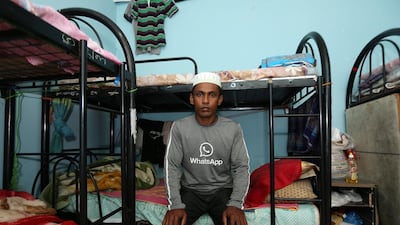DUBAI // It is a tribute to Abdul Kalam’s resilience that at 4.30am he is up and about, with barely half an hour to eat and dress before the company bus arrives.
The 29-year-old was one of the survivors of the bus crash on Emirates Road last Saturday, which killed 13 labourers. He lives in Umm Al Quwain and works in Dubai.
“Until the accident last week, I was never scared,” the Bangladeshi fabricator said. “Now many of us are really scared to sit on a bus. I am worried how I will get to work.
“If our camps were closer to the workplace, we would never have had to travel so much and this would never have happened.
“As a rule, workers should be made to stay not more than 30 minutes away from their camps.”
This echoes a recent call by the Emirates Human Rights Association to force companies to house labourers closer to their worksites.
“Accommodations are cheaper in places like Umm Al Quwain and companies prefer that,” said Mr Abdul Kalam. “But it is us workers who have to travel so far.
He said making seat belts mandatory in workers’ buses would help prevent such deadly accidents.
“I think seat belts would help. Workers would use them if it protects them. Company buses should have them to protect us and keep us safe during such accidents.”
He also criticised the lack of air-conditioning in buses.
“Some of our buses have AC but not all. All buses that carry workers should have AC,” he said.
“We work in the sun the whole day and then sit in the buses and, if it is as hot, it doesn’t help.”
Mr Abdul Kalam’s daily routine is further proof of his resilience.
By 5am, he and his co-workers leave their accommodation for the almost two-hour ride to their work site in Jebel Ali.
The commute is almost 110 kilometres each way.
“We don’t have time for anything,” he said.
“We carry our breakfast with us. After getting on the bus, we fall asleep in 15 to 20 minutes and wake up only when we reach the site.”
Like most of the passengers, Mr Abdul Kalam was fast asleep when the bus ploughed in to a stationary lorry before flipping over.
“We reach work by 6.50am and have 10 minutes to ourselves before work starts,” he said.
He has a 10-minute break at 9.30, when he eats the food prepared the previous night for breakfast.
His day involves toiling inside unfinished buildings in often overpowering heat.
His next break is for lunch at 12.30pm, when the workers get an hour to eat and rest.
After a 10-minute tea break at 4pm, his 12-hour shift comes to an end at 7pm and the men line up to board the bus for the ride home.
They usually reach their accommodation at 9.30pm.
Mr Abdul Kalam, who earns between Dh600 and Dh1,500 a month, uses what is left of the day and his energy to make dinner, wash his clothes and shower. The men make curries and buy two rotis, or flat breads – one to eat with breakfast, and the other for lunch – from a nearby restaurant.
“We are so exhausted by the time we fall asleep around 11.30 in the night,” he said.
The five hours of rest is all they get before the dreary, tiring routine repeats itself the next day.
This has been his daily life for the past six years, since he left his hometown in Bangladesh.
As a contract worker, he and most of his colleagues are paid Dh6 for each hour of work, when there are jobs for them to do. Some months they have to stay in their camp waiting for work and may earn nothing.
But still the buses are their greatest hardship.
“We leave our parents, wives and children behind and come here to work so hard in the sun every day,” said Mr Abdul Kalam. “Somebody should take responsibility for us.”
pkannan@thenational.ae

